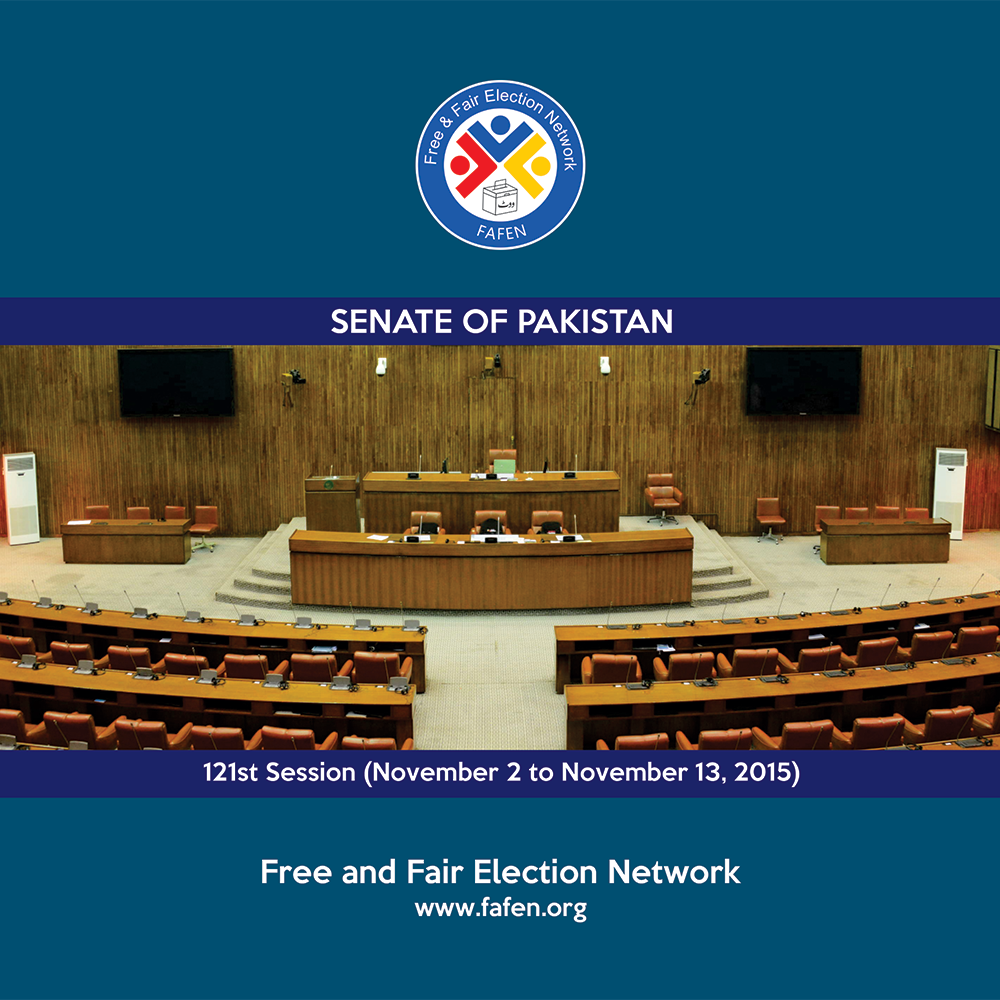The return of MQM lawmakers to the House after 11 weeks, debate on law and order, climate change challenges, economic issues and ISPR’s criticism on governance are the main highlights of the 10-sitting 121st session of the Upper House, starting from Nov2 and ending on Nov13, 2015.
The Senators expressed their concerns on the China Pakistan Economic Corridor (CPEC) route, the price of imported Liquified Natural Gas (LNG), foreign policy especially after Pakistan’s defeat in the United Nations Human Rights Council (UNHRC) polls, relief efforts in the earthquake-hit areas, ability of civil departments to cope with the natural disasters and appointments being made against Balochistan quota, says FAFEN Parliament Monitor in 121st Session Report of Senate of Pakistan.
The session, however, did not yield much in terms of legislation as only one bill – the Anti-Money Laundering (Amendment) Bill 2015 – was passed while a private bill – the National Accountability (Amendment) Bill, 2015 – was introduced. Two ordinances were laid and forwarded to the relevant committee.
The interest of legislators was observed to be better than the previous session, as 62 lawmakers were present on average during the reporting period as compared to 56 legislators during the last session.
The 121st session of the Senate witnessed a marked improvement in taking up parliamentary business being private or government. The House strictly followed the schedule for each sitting as they faced a delay of only one minute, on average.
Taking up all agenda items during 10 sittings is one of the greatest accomplishments of the House, as it considered the entire 111- item agenda appeared on Orders of the Day. The House addressed 84% (93) agenda items while most of the remaining 16% (18) interventions could not be addressed due to the absence of movers or they were not admitted. During the previous session comprising seven sittings, only 69 agenda items appeared on Orders of the Day. Of these, 80% (55) were taken up while the rest of agenda remained unaddressed.
The agenda items of the treasury as well as the opposition lawmakers were considered during the session. However, the Question Hour was marred by the absence of ministers or their representatives as well as the movers. During the session, the Chair once suspended the proceeding for 15 minutes due to the absence of relevant ministers. Only 37% (73 of 195) of the starred questions were taken up while the rest of them remained unaddressed.
During first sitting of the session, Senate Chairman gave the ruling on acceptance or otherwise of the MQM Senators’ resignations. The Chairman stated that the confirmation of resignations was due after completion of 40 consecutive days of the proceeding. He said only 13 consecutive days had passed till November 2, 2015. About non-participation of MQM members in the House proceedings and their lapsed agenda, the Chairman said they could seek condonation of their absence if they so desired and might re-submit the agenda.
The government had to face severe criticism over its foreign policy and failure to become member of the 47-member UNHRC in re-election process after serving for three terms. The Chairman referred the matter to the Standing Committee on Foreign Affairs and directed to submit report within a month, besides determining reasons for losing the seat.
The Senate session witnessed clarification by the government regarding delay in NFC and change in CPEC’s route. The Finance Minister assured the House that the new NFC award will be finalized at the earliest; adding that the extension in 7th NFC Award is not unconstitutional and will continue till a consensus is reached on new award. The Minister for SAFRON assured the House that the decision of All Parties Conference on CPEC route will be implemented in letter and spirit.
The House also witnessed adoption of eight resolutions. Two resolutions each were related to governance, economy while one resolution each was on issues of health, development project, federal employees, archaeology, parliamentary privileges and tribute to the greatest national poet.
Senators spoke on 137 Matters of Public Importance consuming 345 minutes – 17% of the session time. A total of 17 reports were presented by various Standing Committees during the reporting period.
The House also took up nine Calling Attention Notices (CANs) relating to unusual banking practices, irregularities during appointments in OGRA, expansion work at airport in Peshawar, postponement of OIC summit, salary issue of employees at Islamabad Model College, sale of Jinnah House in Washington D.C., suspension of survey in earthquake-hit areas, non-payment of salary to Pakistan Steel Mills employees and concerns of a Chinese company regarding setting up of a solar park.
Six Motions under Rule 218 came for discussion comprising power sector, foreign affairs and governance issues. The House deferred two privilege motions due to the absence of movers while 18 such motions were settled which were pending since long.
An instance of pointing out the quorum was witnessed during the session by a PkMAP lawmaker following which the Chair ordered the bells to be rung for five minutes. However, it was found complete upon counting and the proceeding was resumed.
The House witnessed six walkouts and one protest, five were staged by the entire Opposition while an ANP lawmaker protested by observing walk out. The walkouts were due to the non-implementation of decisions made in All Parties Conference about CPEC, keeping sale price of LNG secret and lack of permission to speak on matter of public importance. PML-N and PkMAP lawmakers protested over for not taking up their questions despite being on the agenda.
To download complete report, click here
